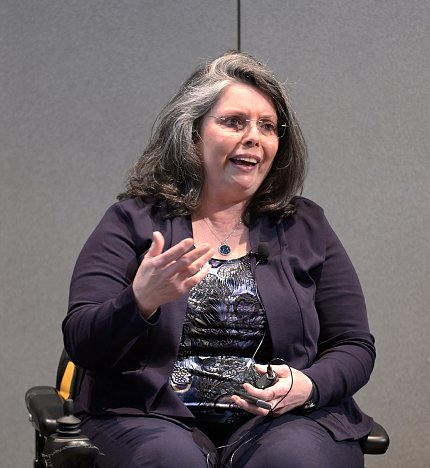Hiring People with Disabilities Is a Win-Win

Photo: Marleen Van Den Neste
Employers benefit when they hire people with disabilities, said Dr. Kathy Mann Koepke at the Office of Equity, Diversity and Inclusion’s first-ever “Cultivating Inclusion: Honoring NIH Champions and Allies of Disability” awards ceremony. She gave the keynote address in Bldg. 45 on Oct. 24.
“We may have limits in parts of our sensory system, motor system, or our mental health processes, but that doesn’t mean we can’t be successful and meaningfully contribute,” said Mann Koepke, the 2019 recipient of the Yvonne Thompson Maddox Award for Equity, Diversity and Inclusion and a program director in NICHD’s Division of Extramural Research. “Look at what we do, not what we look like.”
Hiring people with disabilities is a win-win result for everyone, she noted. They are creative problem-solvers, loyal employees and passionate about what they do. They bring the perspective of a large cohort of the American population to your workplace and product.
Employing them shows that organizations care about diversity and inclusivity, said Mann Koepke. “When we’re in a workplace, colleagues know that our employers value what employees produce and not what we look like, not what color our skin is, what religion we’re part of or what sexual orientation we are.”
Unfortunately, many hiring officials are unaware of the talents of the disability community. According to Mann Koepke, perception and communication are two of the biggest challenges the community faces. “There are biases, prejudices and myths about what people with disabilities can and cannot do,” she said.
Supervisors who want to be allies of the disability community must strive to create a barrier-free workplace so “all employees have the opportunity to effectively contribute.” They must, for instance, give employees the ability to safely, voluntarily self-disclose any disability and ask for reasonable accommodation that allows them to excel at their job.
Mann Koepke noted that there are members of the disability community who don’t realize there are opportunities in government. Actively reaching out to candidates at all levels who may not know about job opportunities is important, she said.
“Each and every one of us—no matter where we are in the pecking order, no matter what our job is—plays an important role in including everyone at NIH,” Mann Koepke concluded. “Inclusion has to start with I.”
After the keynote, EDI honored several employees from the disability community and their advocates for significant contributions to science and their work toward disability inclusion to help advance NIH’s mission.

Photo: Marleen Van Den Neste
Winners of the Disability Ally Award are:
- NCI’s Dr. Kent Hunter, for providing post-baccalaureate and post-doctorate opportunities to deaf and hard-of-hearing trainees.
- NIAMS’s Yanira Ruiz-Perdomo, for advocating on behalf of patients enrolled in rheumatology clinical trials.
Winners of the Disability Champion Award are:
- NIEHS’s Stella Sieber, for advocating on behalf of the limb loss/limb difference community.
- NICHD’s Dr. Caroline Signore, for strengthening research on the reproductive health care needs of women with disabilities.
- NIDDK’s Dr. Anne Sumner, for advancing the disability community in research and making NIH a more welcoming environment for those with disabilities.
- NIDCD’s Kelli Van Zee, for promoting and advocating for disability awareness at NIH.
Joseph Cox, Sean Cullinane, Louise Davis, Nicole Huntington and Michelle Mejia received the Disability Ally Group Award, for their work to address parking and transportation needs of the disability community. The recipients work in the Division of Amenities and Transportation Services’ Transportation Services Branch, ORS.
To read more about the awardees, visit https://www.edi.nih.gov/people/sep/pwd/disability-awareness-2019/awards.
